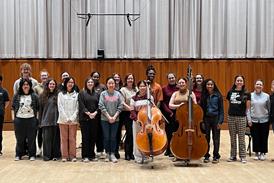Brian Hodges answers student questions on coping with stage fright

The dilemma: My hands get so sweaty when I play and my bow hand slides all around. Is there anything I can do to prevent this from happening?
This is a very common problem among string players and can cause great anxiety during a performance as you feel your bow position slipping around beyond your control. Unfortunately, there might be not be anything you can do to stop your hands from getting sweaty altogether, but there are some things that can do to help you play under that circumstance.
- Bring a cloth or handkerchief on stage. In rests or pauses in the music, wipe your bow hand with it, and don’t forget to wipe the bow off as well. Make sure it’s not the same cloth you use to clean your strings with as it will then get rosin and grime all over your hand.
- Practise with a wet bow hand. This is known as adversity practising, where you recreate the situations you perform under and practice how to manage them. By working in a controlled environment such as the practice room, it can better prepare you for how you will handle it on stage. If your hands get sweaty on stage, practise with damp hands in the practice room.
- Use a barrier. The most common problem when your bow hand gets sweaty is that is causes your hand to slide on the bow. It feels as though you might drop the bow, or it prevents you from doing certain bow strokes as your hand isn’t in the correct spot. Some people have resorted to putting some sort of barrier on their bow, in the form of a rubber grip or even a rubber band, to stop their hand from moving past a certain point. I wouldn’t recommend putting anything permanent on it, only something that can be removed later on.
- Practise performing as much as you can. Sweaty hands is a physical response to nerves while your perform. If you are able to get your anxiety more manageable, this could alleviate some of the more severe symptoms, such as sweaty hands. Securing your mindset can go a long way towards affecting the rest of your body’s response to nerves: racing heart, shaky hands, etc. Perform for as many people as possible in as many different situations as possible. Learn how you react in performing situations. Practise mindful thinking to focus on the music rather than your nerves. In time, this could diminish many of your physical symptoms and allow you to perform at your highest level.
Read: Release the Fear Monster: how to conquer anxiety and perform at your best
Read: Conquering performance nerves: how do I control my fear of failure?
Read: Conquering performance nerves: how do I banish sweaty hands and nausea?
Read: Conquering performance nerves: I’m great in practice but don’t perform so well on the day
Read: Conquering performance nerves: how can I warm up my stiff, cold hands?
Read: Conquering performance nerves: how can I become more comfortable during lessons?
Read: Conquering performance nerves: how do I overcome the fear of not being good enough?
Read: Conquering performance nerves: staying focused on stage
Brian Hodges is an active soloist, chamber musician and teacher. He is associate professor of cello and coordinator of chamber music at Boise State University in Boise, Idaho. He is the principal cellist of the Boise Baroque Orchestra and performs regularly with Classical Revolution: Boise, which has been featured at the Idaho Shakespeare Festival and live on the radio at Radio Boise. He can be reached at www.brianhodgescello.com
Brian presented on the topic of performance nerves at the 2016 American String Teachers Association conference. The 2018 conference takes place from 7-10 March in Atlanta.











































No comments yet